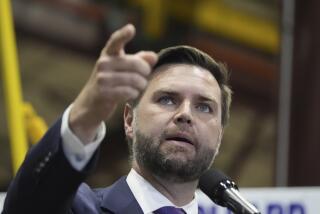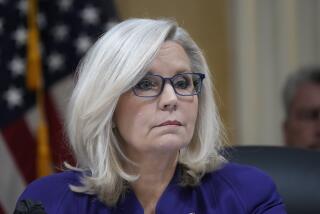Cheney: Obama terrorism policies make U.S. vulnerable
- Share via
WASHINGTON — Former Vice President Dick Cheney said Sunday that President Obama has intensified the nation’s risk of terrorist attacks by jettisoning key elements of the Bush administration’s aggressive approach.
The criticism came in a broad-based attack on Obama during a Sunday news program in which Cheney also disagreed with expanded White House involvement in the economy and denied that President Bush was responsible for the nation’s financial ills. The White House did not comment.
Cheney has sharply questioned Obama before, but the latest attempt comes amid a chorus of Republican criticism that nonetheless has had little effect on Obama’s popularity or his success in Congress.
Cheney contended that the key elements of the Bush administration’s approach to terrorism were “absolutely essential” to what he described as its success in foiling subsequent plots after the Sept. 11, 2001, attacks. In particular, he said, it was crucial that the nation treat the fight against terrorism as a war rather than a law enforcement issue.
Since taking office, Obama has announced plans to eventually close the Guantanamo Bay, Cuba, detention facility; banned waterboarding, a simulated drowning technique used in interrogations; said he would require CIA interrogators to abide by rules in the Army Field Manual; and ordered the closure of secret intelligence interrogation sites.
“Now he is making some choices that, in my mind, will, in fact, raise the risk to the American people of another attack,” Cheney said on CNN’s “State of the Union.”
Cheney said Obama was returning to the Clinton administration’s approach of treating terrorism as a law enforcement matter rather than a “war.” He warned that this would reduce the effectiveness of the U.S. response.
“They are very much giving up that center of attention and focus that’s required,” he said.
In addition, Cheney criticized the new administration’s approach to business regulation and said Obama’s plans to reform healthcare, energy and the environment constituted “one of the greatest expansions of federal control over the private economy, probably in the history of the republic.”
He said he worried that the administration was using the economic crisis to justify an expansion of federal intervention.
Obama has said that he generally favors limited government but that he would take whatever steps are needed to ease the economic crisis.
Although he acknowledged that the economy Obama inherited was “difficult,” Cheney said the Bush administration did not deserve the blame that Obama and other administration officials were directing its way. He called the downturn a “global problem” and argued that the Bush administration’s effort to deal with a key ingredient -- the disarray in the government mortgage institutions Fannie Mae and Freddie Mac -- was blocked by Democratic committee chairmen in Congress.
The accusation represents a frequent Republican explanation for the financial crisis, although economic experts have described the reasons as more numerous and complex than the problems at the two government-backed mortgage giants.
Cheney said he was satisfied with Obama’s plans to gradually withdraw U.S. combat troops from Iraq. He said Obama appeared to be heeding the advice of Army Gen. Raymond T. Odierno, the senior military commander in Iraq, and had “modified” the plans for a rapid drawdown that he had laid out in the campaign.
Cheney declined to describe his confrontation with Bush in the final days of the administration over Bush’s unwillingness to pardon former Cheney Chief of Staff I. Lewis “Scooter” Libby.
Libby was convicted of perjury and obstructing justice in the Valerie Plame-CIA leak investigation. Bush did, however, commute Libby’s 30-month prison term nearly a month after the sentencing in 2007.
But Cheney said he might reveal details in the memoir he plans to write about his decades in government.
When asked whether right-wing talk radio host Rush Limbaugh is -- as conservative David Frum has described him -- “kryptonite” for the Republican Party, Cheney disagreed.
“No, Rush is a good friend,” he said. “I love him. I think he does great work and has for years.”
A succession of Republicans, including new National Committee Chairman Michael S. Steele, has criticized Limbaugh, then apologized amid a conservative backlash.
Limbaugh says he wants Obama to fail and has challenged the president to a debate on his radio show.
“I’d pay to see that,” Cheney said.
--
More to Read
Sign up for Essential California
The most important California stories and recommendations in your inbox every morning.
You may occasionally receive promotional content from the Los Angeles Times.














